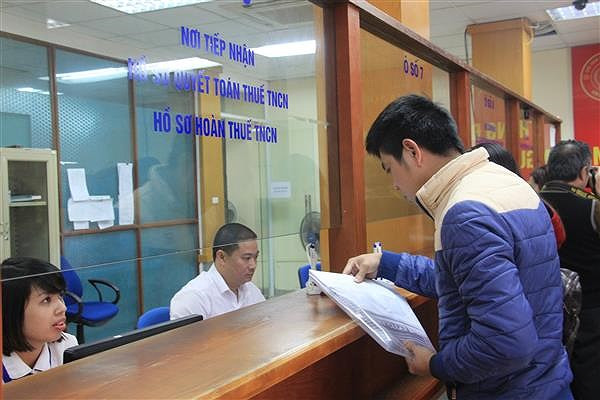Do tax officials have the right to prosecute violating businesses?
When detecting tax law violations that require criminal prosecution, the tax authority and tax officials have the authority to initiate criminal proceedings, prosecute the accused, and conduct investigative activities in accordance with the provisions of the criminal procedure law and the law on criminal investigation organization. This proposal has caused many concerns.
The Draft Law on Tax Administration (amended) was reported by the National Assembly's Law Committee to the National Assembly Standing Committee to be added to the 2018 Law-making Program for comments at the 6th session and approved at the 7th session.
A notable point in this draft law is that the Ministry of Finance proposes to add a policy on tax investigation to the draft Law on Tax Administration (amended) in the direction of adding regulations on the authority of tax authorities and tax officials in implementing measures to prevent, combat and stop tax law violations and tax evasion.
|
| Consider empowering tax officials. |
Specifically: when detecting a violation of tax laws to the extent that criminal liability must be prosecuted, the tax authority and tax officials have the authority to initiate a case, prosecute the accused, and conduct investigation activities according to the provisions of the law on criminal procedure and the law on organization of criminal investigations.
One of the reasons cited by the Ministry of Finance is that the rate of tax violations being criminally prosecuted is still low because tax law violations are complex and diverse, occur on a large scale, and are related to documents, books, accounting, payments, etc.;
According to the Ministry of Finance, "tax investigation" is only a professional measure, only investigated when there are signs of organized tax fraud, tax evasion, systematic connection between many organizations and individuals; that is, when the inspectors are not capable of doing the job, then tax investigation will take place.
“Tax investigations are administrative in nature and do not aim at prosecution; tax investigation agencies do not arrest people but will coordinate with criminal investigations when necessary,” the Ministry of Finance affirmed.
Regarding this proposal, the Director of a tax consulting company said: "Recently, an accountant told me that her company issued an invoice to a retail customer, stating that the buyer was a retail customer, so the red copy had not been torn off the stub. When the invoice was brought to the Tax Department for inventory, she was fined 6 million VND. Although she explained to the tax department that she had not given the red copy to the customer, not that she had not given it, they did not agree and made a decision to fine her."
"If we add the right to investigate, all businesses in Vietnam will have problems in the eyes of the tax authorities," he wondered.
According to the above director, with the current tax team, tax collection is not effective due to poor qualifications; unstable ethics due to selfish interests; the system of documents and legal corridors lack transparency; too many group interests still exist, affecting the common development,...
"Why not improve the value and qualifications of staff to manage well? Why are we so greedy for power?", this person wondered.
 |
| Previously, this proposal of the Ministry of Finance encountered many opposing opinions from ministries and branches. |
Specifically, according to the Ministry of Justice, this requires an assessment of the impact on the professionalism and expertise of tax officials in litigation activities and clarification of the scope of tax investigation activities.
"In the case of adding authority to the tax authority and tax officials in prosecuting cases and prosecuting defendants, how this policy affects the legal system (especially criminal proceedings) also needs to be specifically assessed," the Ministry of Justice commented.
The Ministry of Information and Communications also proposed not to add the Tax Investigation function to the amended Law on Tax Administration because currently, the investigation function under current regulations is not under the authority of the tax administration agency. In some cases, the tax administration agency is also the subject of tax investigation, so tax investigation should be carried out by an agency independent of the tax administration agency to ensure transparency and compliance with the functions and tasks of the management agencies.
Not necessary
If the tax authority is given the right to investigate and prosecute, the Vietnam Chamber of Commerce and Industry (VCCI) is concerned about the situation of "both playing football and blowing the whistle".
VCCI recommends considering adding an investigation function because if an additional function is added to the Tax Authority - the tax investigation function, then the same agency and apparatus will be responsible for tax collection, inspection, and tax investigation. This could reduce the objectivity of the investigation and litigation activities and reduce the transparency of tax management activities.
Mr. Nguyen Anh Duong, Central Institute for Economic Management Research, commented: "In terms of tax compliance, I always support the method of complying with legal discipline instead of using strong coercive measures to handle this issue."
“Why don’t people really pay their taxes seriously? Is it because our tax policy is not really encouraging? Maybe we don’t need to innovate our tax collection policy, but just change the way we interact with people to implement tax policies, which will help improve tax collection efficiency and avoid pushing the burden onto people,” Mr. Duong shared.
Mr. Duong also admitted that "no citizen likes to pay taxes", but he also said that using tax enforcement measures such as adding the right to investigate and prosecute "only makes it easier to carry out public duties but does not necessarily solve tax problems".
“Assuming that such measures are taken, will the cost of implementing them be greater than the expected tax revenue? From such a pragmatic perspective, the proposal to give tax authorities the right to investigate and prosecute may not be really necessary,” said Mr. Nguyen Anh Duong.

